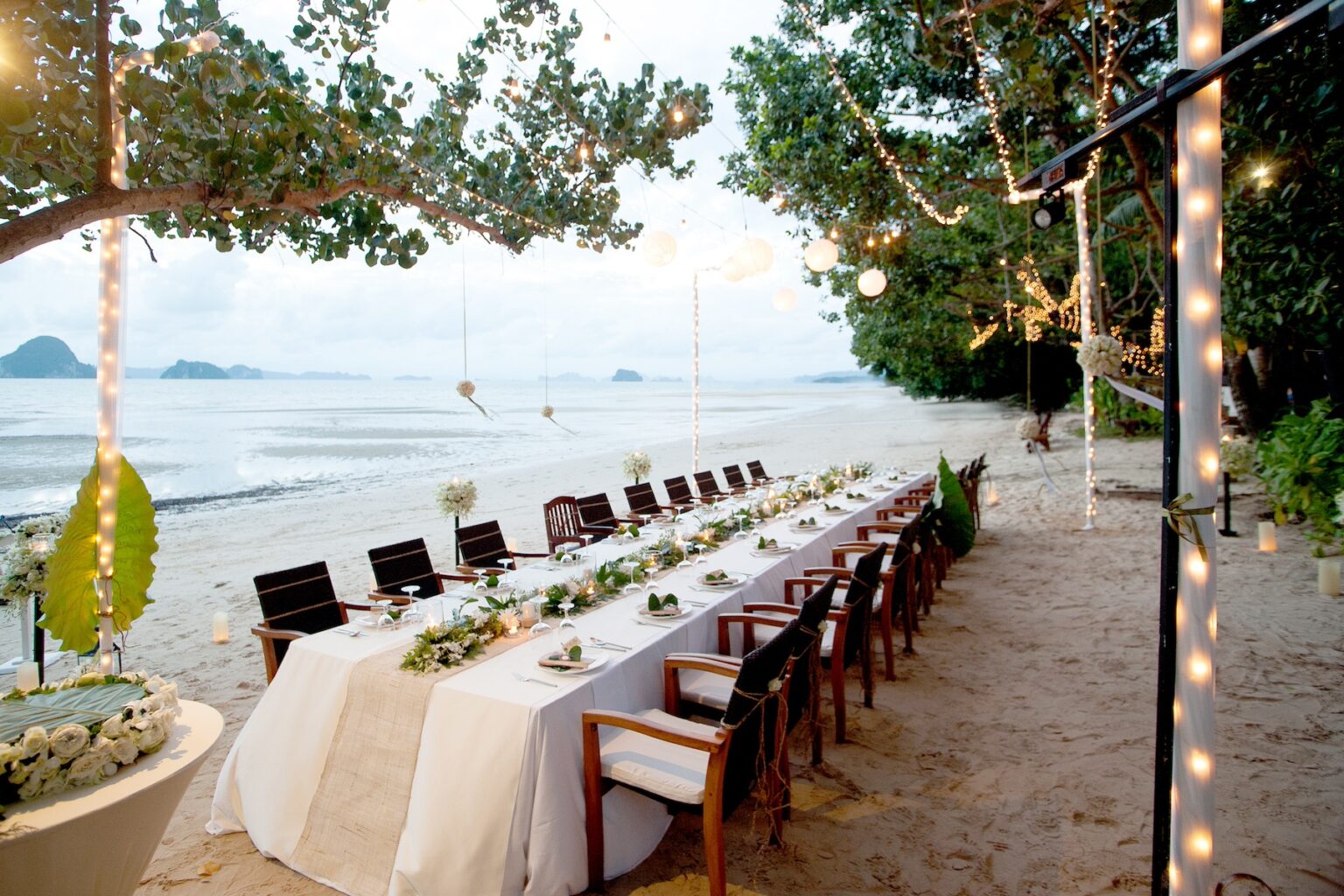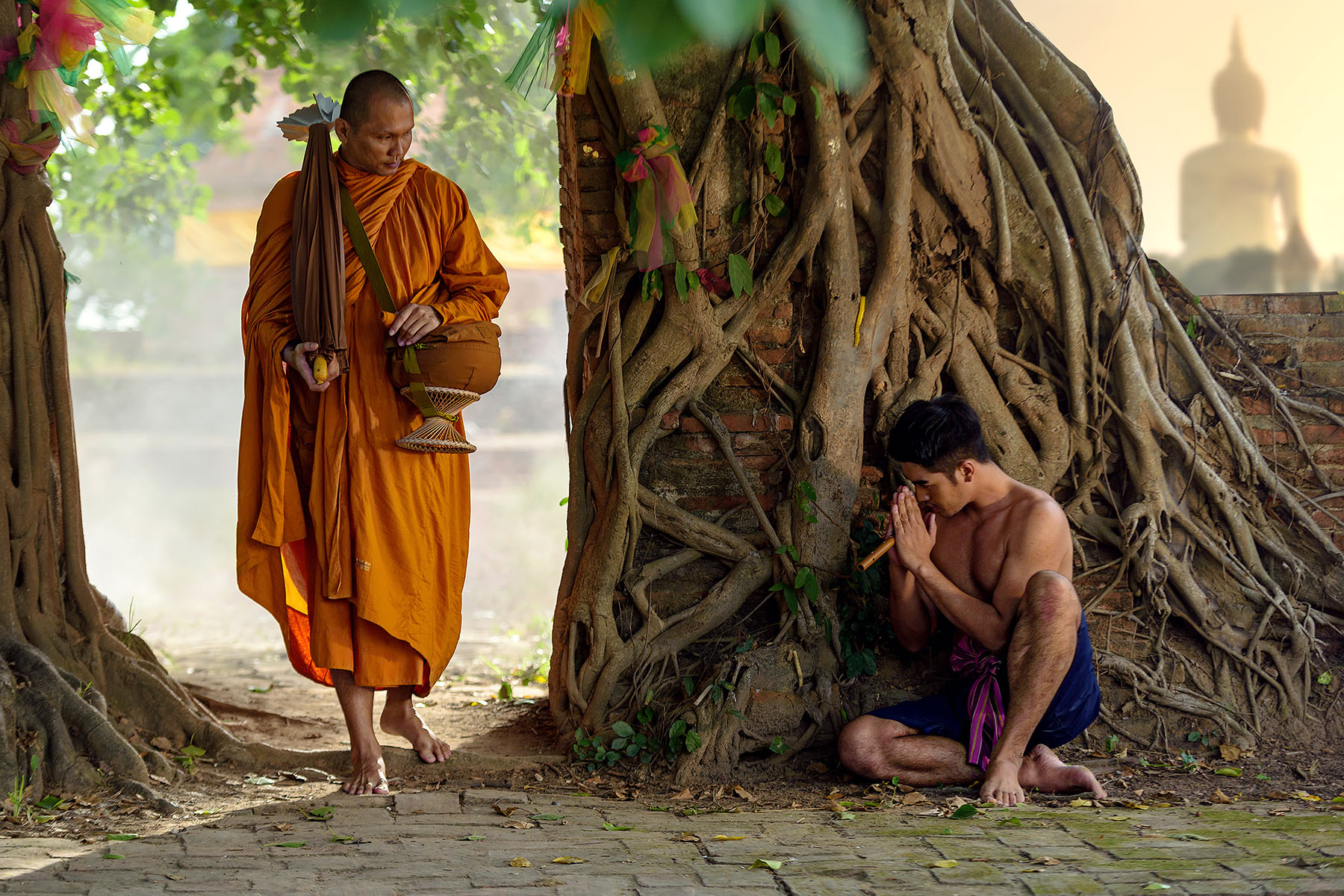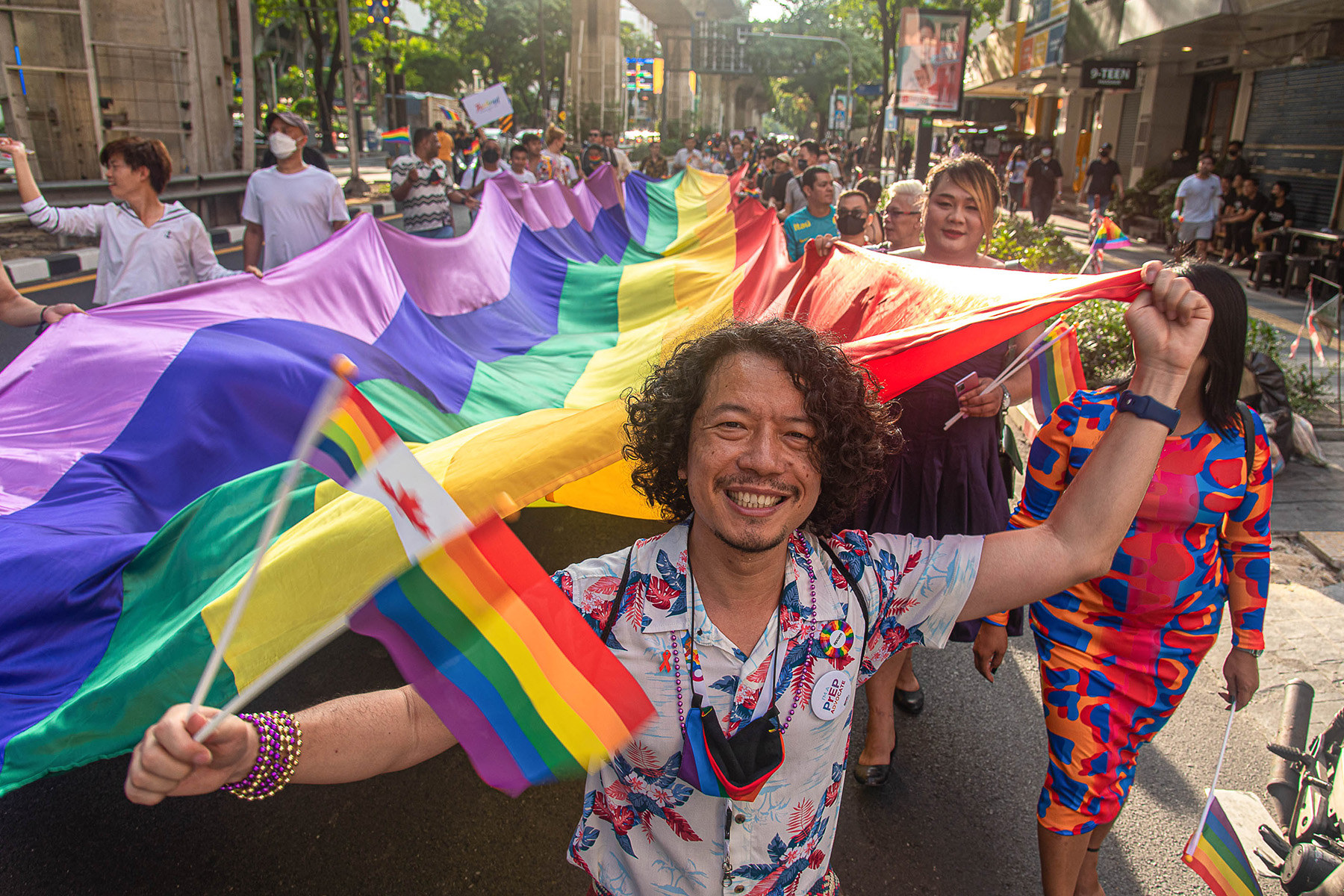For engaged expats, it doesn’t get much more romantic than a wedding (งานแต่งงาน: meaning decoration work party) in Thailand. With its diverse landscapes and vibrant culture, the country offers a myriad of options for walking down the aisle.
From serene beachside ceremonies in Phuket to elaborate receptions in Bangkok’s luxurious hotels, it’s easy to see why Thailand is a popular choice. Facilitated by accommodating venues, experienced planners, and the country’s welcoming atmosphere, it’s easy to start planning the wedding of your dreams in Thailand.
Keep reading for information on these topics:
- An overview of marriage and weddings in Thailand
- What types of weddings are possible in Thailand?
- Gay marriage and same-sex weddings in Thailand
- Civil/domestic partnerships in Thailand
- The legalities of getting married or having a wedding in Thailand
- Wedding planning in Thailand: step by step
- Wedding costs in Thailand
- Top wedding locations in Thailand
- Thai wedding traditions and customs
- Useful resources
An overview of marriage and weddings in Thailand
In the past, Thailand had one of the highest marriage rates in the world, but things have changed slightly in the 21st century. For instance, divorce rates have jumped, and an increasing number of women are opting to stay single.
That’s not to say that Thai traditions have disappeared. Marriage (การแต่งงาน) is still a commonly accepted goal for most people, and single parents are relatively rare. While the average age of marriage has gone up over the past decades, it’s still lower than in Europe, with both men and women usually marrying before the age of 30.

If you’re dating in Thailand with your eye on marriage, you’ll need to keep certain traditions in mind. Sin sod (สินสอด), the Thai dowry (also known as the bride price), is still alive and well in the 21st century. Prospective grooms should be prepared to pay their bride’s family a decent sum of money. Weddings often feature conspicuous displays of wealth, so you should start saving up if you plan to get hitched.
Lucky couples will get the dowry given to them by parents who want to see them set up their new life together with sufficient funds. However, many parents still keep the dowry as compensation for having raised the daughter and for the daughter being taken away from the family.
Attitudes towards marriage and weddings
Thailand holds onto many cultural traditions where weddings and marriage are concerned. Most people see marriage as necessary, and there’s an expectation that long-term relationships will lead to matrimony. That’s particularly true if children are involved. Fathers have no rights over children born out of wedlock unless they go through a legitimization process. Although the number of single mothers in Thailand is on the rise, there’s still a stigma attached.
Historically, Thailand practiced polygamy. Although it has been illegal since 1935, some forms still occur today. In rural areas, men may still have multiple wives, although only the first has legal rights. Even the royal family practices a form of polygamy, with the king selecting women to be his official concubines.
There is still a double standard at play when it comes to women’s rights. Female infidelity carries more social stigma, and a woman who attempts to take more than one husband would face enormous backlash.
Thailand is one of the more LGBT-friendly countries in Southeast Asia. Mainstream politicians in Thailand are happy to attend pride parades, and the country officially recognizes same-sex marriage as of September 2024.
What types of weddings are possible in Thailand?
Most Thais are Buddhists, so the country’s traditional wedding ceremonies tend to be religious. However, as Thailand has become popular as a wedding destination, different ceremonies are now available.
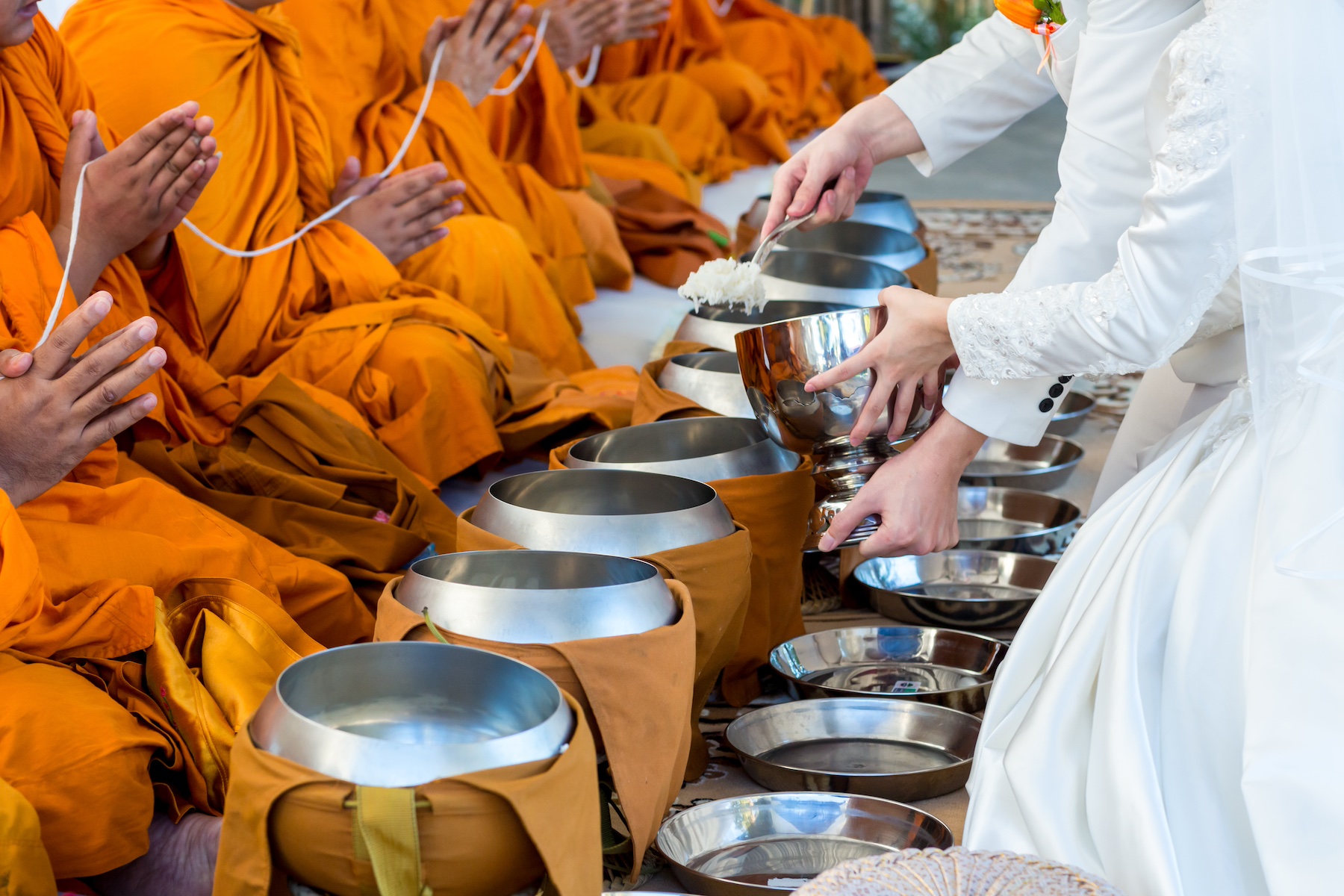
No matter what type of wedding ceremony you choose, you will need to register your marriage separately. If you travel from abroad specifically for a destination wedding in Thailand, you can save hassle by registering your marriage in your home country. The wedding ceremony can be seen as a symbolic celebration, but it carries no legal weight.
Traditional weddings in Thailand
The traditional Thai wedding ceremony is Buddhist but usually takes place in a hotel, resort, or private home rather than a temple or other religious building. For luck, the couple may invite monks (always in odd numbers) to offer blessings. The couple and their guests will then discreetly provide the monks with some money, as they believe donating will help their marriage be long and happy.
Many aspects make up a Thai wedding day, including blessings, counting the dowry, and a party in the evening. Most weddings have between 100 and 300 guests.
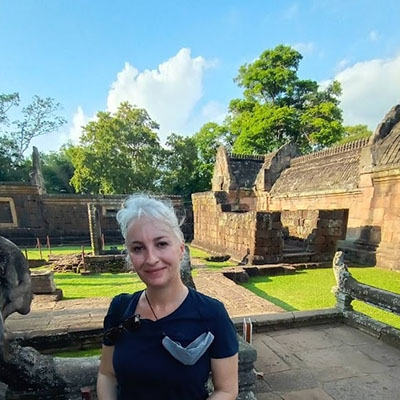
Local expert
Jane Evans
Insider tip
Don’t wear black or white clothes to a wedding in Thailand; these colors are reserved for funerals.
Christian weddings
Thailand has a very small Christian population, and church weddings are uncommon. That said, many couples from other countries now travel to Thailand for their weddings.
Traditional Christian weddings need to take place inside a church. As Northern Thailand has a larger Christian community than other parts of the country, it’ll be easier to find a suitable venue there.

Organizing a Christian wedding in Thailand usually involves liaising with a minister or priest in your home country and contacting one of their Thai colleagues. The exact requirements vary, as different denominations of Christianity have their own rules. Several companies offer Christian wedding packages, usually including an English-speaking priest or minister; this may be the easiest option for couples looking to marry.
Indian weddings
Although Thailand doesn’t have much Indian community, it’s an incredibly popular choice for those who want a destination wedding. In fact, Indian couples comprise about 60% of Thailand’s destination weddings.
A traditional Hindu wedding ceremony does not need to take place in a religious building. Indians may choose to have their wedding outdoors, taking advantage of Thailand’s natural beauty. These weddings are usually lavish affairs, with huge numbers of guests, and the ceremonies and feasts may last several days. Professional wedding planners (นักวางแผนงานแต่งงาน) help organize Indian weddings in Thailand.
Islamic weddings
Thailand has a small Muslim population that opt for Islamic weddings. Like a Buddhist wedding, a Muslim wedding in Thailand involves the groom paying his bride’s family a dowry.
The wedding ceremony is very short, but the couple often invites many people for an elaborate, full-day celebration. The couple must sign a traditional Islamic wedding contract at a Muslim wedding. The Thai government allows the enforcement of Sharia law in certain parts of the country.
Other kinds of weddings
Ultimately, anything goes when it comes to a wedding ceremony in Thailand. The ceremonies are not legally binding, and the marriage registration takes place elsewhere, so creative brides and grooms can let their imaginations run wild.
Theoretically, you could have a wedding ceremony anywhere in Thailand, although many people opt for a destination wedding in a stunning villa or beach. Abseiling weddings, underwater weddings, and ceremonies on elephant back are all possible.
If you have religious concerns to consider, discuss them first. You may need to fulfill certain religious obligations before your wedding celebration in Thailand.

Some Thais opt to enjoy both a Global North-style wedding and a Thai-style wedding. The bride and groom wear traditional Thai wedding attire for the Thai-style wedding. It is often held in the morning with close family. For the Global North-style wedding, the bride wears a white gown, and the groom wears a tuxedo to a large party held in the evening.
Gay marriage and same-sex weddings in Thailand
Thailand has long been known as a welcoming destination for LGBT people and is often considered the most gay-friendly country in Asia. Same-sex marriage (การแต่งงานของเกย์) has only recently been made legal, and so, only some companies offer same-sex wedding packages. Same-sex couples can also choose to enter a civil partnership (การอยู่กินด้วยกัน). At least one member of the couple must be a Thai national for their relationship to be registered.
Although Thailand is renowned for its trans-friendly attitude, there are some legal barriers there, too. Trans people cannot legally change their sex, meaning that, for example, a trans woman and a cis man would be regarded as a same-sex couple.
Civil/domestic partnerships in Thailand
There is no common-law marriage in Thailand. Different-sex couples must marry if they want their relationship to be legally recognized.
The legalities of getting married or having a wedding in Thailand
If you want a destination wedding ceremony in Thailand, you’re in luck. You can easily carry out the legal marriage in your home country and then travel to Thailand to celebrate. This won’t require any paperwork. However, if you’d like to legally register your marriage in Thailand, you’ll have to follow these steps:
Requirements and rights
Usually, no minimum residency period is required to register a marriage in Thailand. However, checking with your country first is essential, as some exceptions may exist. For example, Irish nationals must go through a 28-day waiting period after declaring their intent to marry.
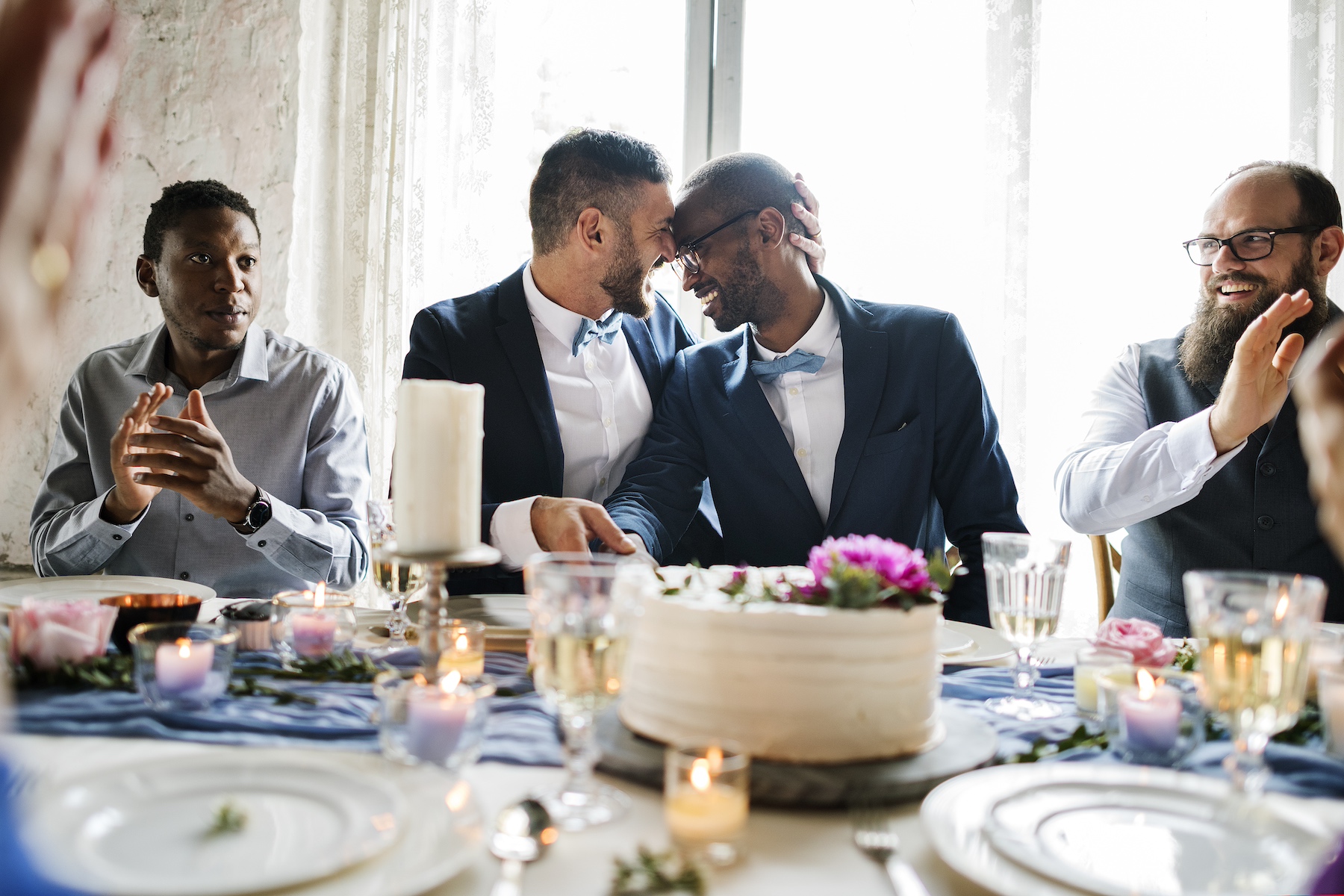
First, expats must go to their country’s embassy in Thailand to sign legal declarations confirming that they are single and free to marry. Once that’s done, they’ll need to translate these documents into Thai.
These must be approved by the Legalization Division of the Consular Affairs Department, a process which usually takes two days. Once that is done, you can take the documents to the District Registrar to issue your marriage certificate.
Necessary paperwork and documentation
You should have the following documents translated into Thai by a reputable translator:
- A valid passport
- An affidavit notarized by your embassy or consulate confirming that you are legally free to marry
- If you are divorced, your decree absolute
- If you are widowed, your previous marriage certificate and your spouse’s death certificate
Prenuptial agreements (prenups) are legal in Thailand; however, there is less legal flexibility over their contents than in other countries. They can only cover property and assets and must be carefully drafted to ensure they fit Thai laws.
For your prenup to be legally binding, it must be prepared before the marriage is registered. You will need two witnesses when you sign it, and then you should be ready to enter it into the marriage registry at the same time as the marriage itself. If you are signing a prenup in another country, it has no bearing in Thailand.
Wedding planning in Thailand: step by step
Planning your wedding in Thailand can be as simple or as complicated as you like. The actual legalities are relatively straightforward and usually take a few days to process. Therefore, you will probably spend most of your planning efforts on the ceremony.
Destination weddings in Thailand are very popular, so you can choose from several wedding planners. You’ll also find hotels that offer wedding packages, some with their own planner to help you out.
Step 1: Choose your venue
As destination weddings are popular in Thailand, you should book well in advance to secure your dream venue. Depending on your weather preference, you may want to book around certain months:
- The rainy season in most parts of the country generally lasts from June to October
- November to February offers dry weather
- Between March and May, humidity soars as the monsoon season approaches
- There’s a dry season from June to September on Koh Samui and Koh Phangan
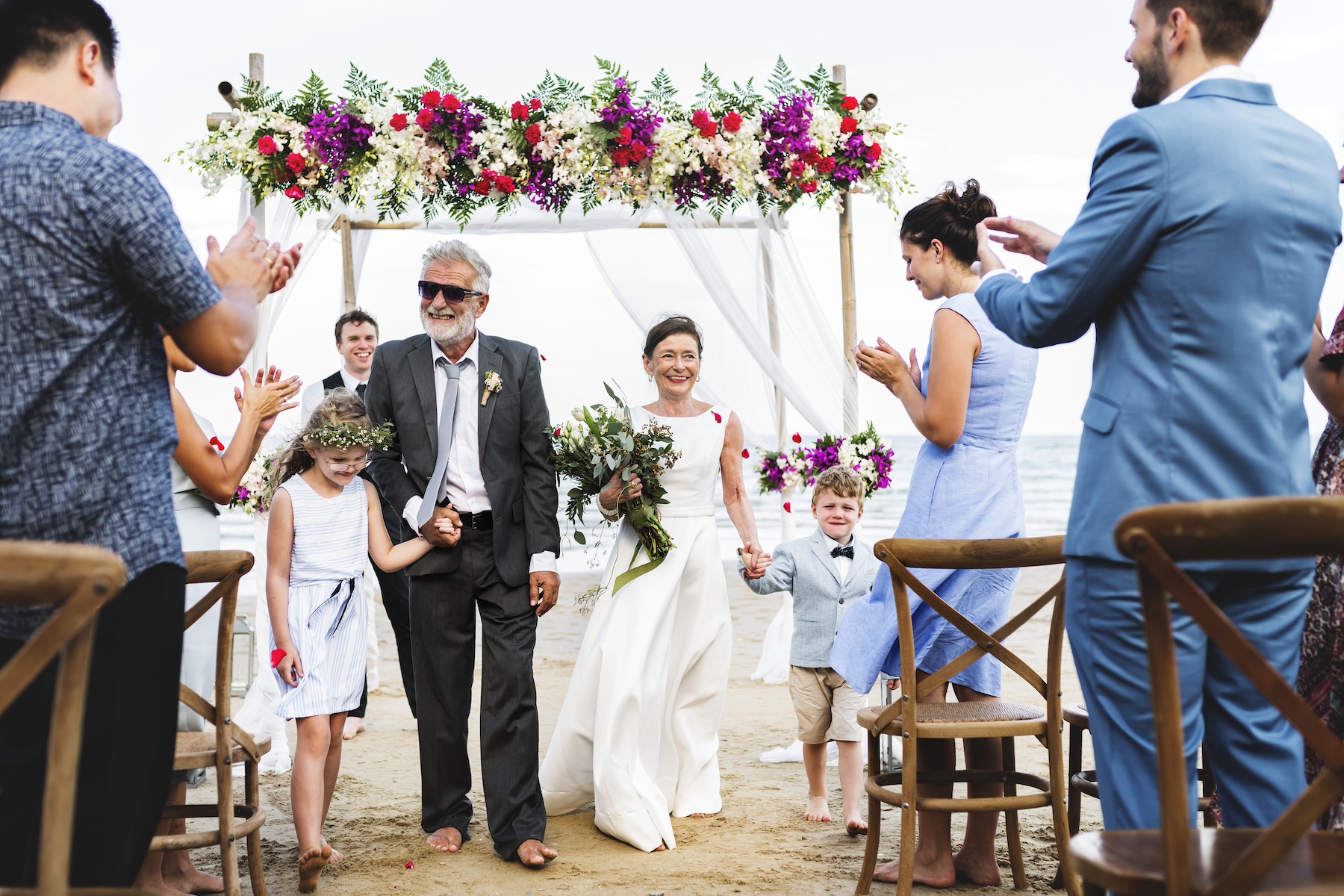
Generally, December is the most popular month for weddings in Thailand. If you plan to get married around Christmas time, book early to avoid disappointment.
Step 2: Start planning
At this point, you’ll have to decide how to plan your wedding. A wedding planner may be more expensive but will care for your needs, giving you less work. Many resorts have all-inclusive wedding packages, another option if you want a hands-off approach. You can also take control of every detail, but be careful. You may come up against the language barrier, and a lack of local contacts could cause problems.
If you’re not going down the wedding planner route, list all the services you’ll need to hire. That may include a photographer, hair and makeup, caterers, a DJ, an officiant, and more. It’s always best to shop around early to get the best deals.
Step 3: Register your marriage
You can do this either in Thailand or your home country. If you choose to do it in Thailand, you’ll need to allow three to four days to process the paperwork. It may be as simple as attending a registry office and signing your name in a book in your home country. However, it depends entirely on where you come from, so be sure to do your research.
You’ll want to contact your local minister or priest at this early stage if you have any religious concerns. They can advise you about any spiritual matters connected to your wedding in Thailand.
Step 4: Have your ceremony
With everything planned, all you need to do now is enjoy your big day.
You can even choose to have your ceremony before registering your marriage. Just remember, in Thailand, your wedding ceremony alone is not legally binding.
Wedding costs in Thailand
Costs can vary enormously, depending on whether you’re having a simple ceremony on the beach or a lavish, multi-day extravaganza. The Tourism Authority of Thailand reports that the average Thai wedding costs around ฿5–20 million. An Indian wedding, with 200 to 500 guests for three to five nights, costs an average of ฿10 million.

If you’re on a tight budget, don’t panic. It’s still perfectly possible to get married in Thailand for far less. A small, intimate wedding can cost as little as ฿26,000. You can lower that price further if you or a friend does your hair and makeup. Most Thai couples opt for a pre-wedding photoshoot, which can cost several thousand baht. You can easily remove this from your plans to keep costs down.

Local expert
Jane Evans
Insider tip
It is customary for guests to offer money in a sealed envelope to help the couple with wedding expenses rather than giving gifts.
If you’re getting your marriage registered in Thailand, there will be a few administrative fees. The cost for registering a marriage is very low, in the region of ฿100–150. However, you’ll also have to consider the fees charged by your embassy for notarizing your affidavit and the translator’s fees.
Top wedding locations in Thailand
Many people choose to get married by or on the beach in Thailand. The pristine islands of Koh Samui and Phuket are popular wedding destinations, with resorts offering all-inclusive packages for couples and their guests. In the north of the country, the lush, green landscapes of Chiang Mai also provide an idyllic setting.
If you’d rather get married in the city, Bangkok has plenty of options. Some of the Thai capital’s most luxurious hotels have wedding packages, and the city is dotted with stunning historic buildings ideal for tying the knot.
Thai wedding traditions and customs
The dowry
If you’re a man marrying a Thai woman, you’ll be expected to present her family with sin sod, the traditional dowry. This usually takes the form of money, but it may also involve other gifts, such as jewelry, gold, and even cars or property.
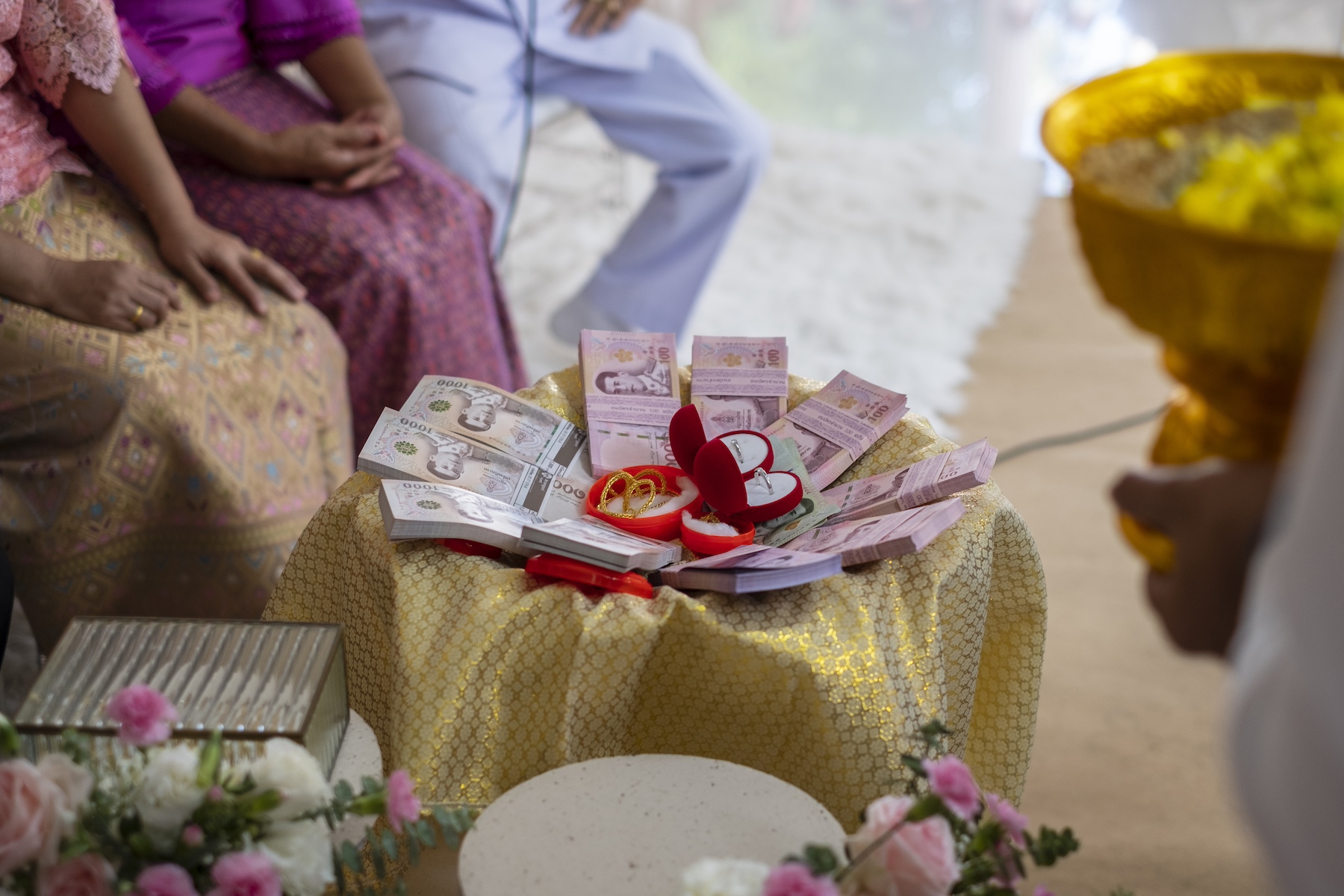
Sin sod is not a private matter. On the wedding day, you’ll participate in a khan maak (ขันหมาก) procession. This is when the groom and his family or friends, accompanied by musicians and dancers, bring the dowry to the bride’s home.
If you come from a culture where money is rarely discussed publicly, you’re in for a shock. At the end of the procession, the bride’s family usually bar their gate, preventing the groom from entering until he presents them with money. The gate guardians often laugh at his offerings, demanding more until he has finally paid enough. Then they’ll open the gate, and he can enter and approach the bride.
Thread-linking
In a traditional Thai wedding ceremony, threads are wedding rings. An elder will use a white thread to link the bride and groom’s heads together. Later, another thread is used to bind the couple at the wrists. The bride and groom need to break this thread. Tradition suggests that the person with the longer piece of thread is more deeply in love than their partner.
Wedding guests will also tie white threads to the couple’s wrists to wish them luck. The newlyweds should keep these on for at least three days, or they risk their luck turning sour.
Living with the bride’s family
Traditionally, newlyweds don’t move into a house of their own. Instead, they live with the bride’s family for three to five years after the wedding.
If the thought of living with your mother-in-law doesn’t appeal, don’t worry. This custom is mostly dying out, though it is still practiced in some rural parts of the country.
Useful resources
- Koro Films – list of wedding planners in Bangkok
- Thai Embassy – how to get married in Thailand
- Wedding Boutique – gay wedding planning in Phuket
